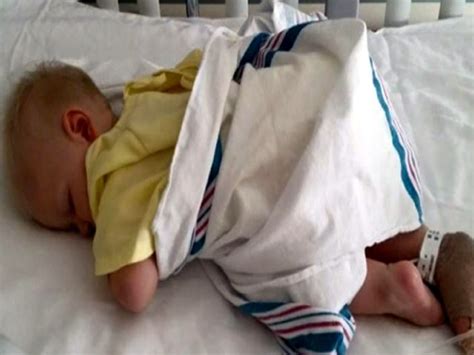
A two-year-old Oklahoma girl is battling a severe E. coli infection, likely contracted after swimming at a splash pad in Elk City, leaving her hospitalized and fighting for her life.
Braelyn Chaney, a vibrant toddler, is currently in critical condition at Children’s Hospital in Oklahoma City, suffering from hemolytic uremic syndrome (HUS), a serious complication of E. coli that can cause kidney failure and other life-threatening issues. Her family believes she contracted the bacteria after visiting the splash pad at Ackley Park in Elk City on May 26th.
“She went from a happy, healthy 2-year-old to fighting for her life in a matter of days,” said Braelyn’s aunt, Destiny Chaney, in an interview. The family is sharing Braelyn’s story to raise awareness about the potential dangers lurking in public swimming areas and to advocate for stricter safety measures.
Braelyn initially presented with typical E. coli symptoms, including diarrhea, vomiting, and stomach cramps. However, her condition rapidly deteriorated, leading to her hospitalization and subsequent diagnosis of HUS. The severity of her case has required multiple blood transfusions and dialysis treatments as doctors work to support her failing kidneys.
“We just want people to be aware of the risks,” Destiny Chaney emphasized. “Splash pads and public pools can be breeding grounds for bacteria, and it’s so important to take precautions.”
The Oklahoma State Department of Health is currently investigating the potential source of the E. coli outbreak, including testing water samples from the Ackley Park splash pad. Results from these tests are pending, and officials have temporarily closed the splash pad as a precautionary measure.
E. coli, or Escherichia coli, is a diverse group of bacteria, most of which are harmless and live in the intestines of humans and animals. However, some strains, such as E. coli O157:H7, can cause severe illness. These harmful strains produce a powerful toxin called Shiga toxin, which can damage the lining of the intestines and lead to HUS.
Symptoms of E. coli infection typically appear three to four days after exposure and can include severe stomach cramps, diarrhea (often bloody), vomiting, and fever. Most people recover within five to seven days. However, in some cases, particularly in young children and the elderly, E. coli infection can lead to HUS, a life-threatening condition.
HUS occurs when the toxins produced by E. coli damage the blood vessels in the kidneys, leading to kidney failure. Other complications of HUS can include anemia, low platelet count, and neurological problems such as seizures and stroke. Treatment for HUS typically involves supportive care, including dialysis to support kidney function, blood transfusions to treat anemia, and medications to control blood pressure and prevent seizures.
The case of Braelyn Chaney highlights the importance of water safety and hygiene in public swimming areas. While splash pads and swimming pools offer a fun and refreshing way to cool off during the summer months, they can also pose a risk of infection if not properly maintained.
Public health officials recommend several steps to prevent E. coli infections at splash pads and swimming pools. These include:
- Avoid swallowing water: This is the most important step in preventing E. coli infection.
- Wash your hands frequently: Wash your hands thoroughly with soap and water after using the restroom, changing diapers, and before eating.
- Shower before swimming: Showering before entering the water helps remove dirt and bacteria from your body.
- Take children on frequent bathroom breaks: Encourage children to use the restroom frequently and change diapers in a designated area away from the water.
- Don’t swim if you have diarrhea: If you have diarrhea, you should avoid swimming until you have been symptom-free for at least 24 hours.
Splash pad operators also have a responsibility to maintain a safe environment for swimmers. This includes:
- Regularly testing the water: Water should be tested regularly for bacteria, including E. coli.
- Maintaining proper chlorine levels: Chlorine is an effective disinfectant that can kill bacteria in the water.
- Ensuring adequate filtration: Filtration systems help remove dirt and debris from the water.
- Providing adequate sanitation facilities: Restrooms and diaper-changing areas should be clean and well-maintained.
The Chaney family is hoping that Braelyn’s story will serve as a wake-up call for parents and public health officials alike. They are urging everyone to take precautions to prevent E. coli infections and to be aware of the symptoms of HUS.
“We don’t want any other family to go through what we’re going through,” Destiny Chaney said. “It’s heartbreaking to see your child suffer like this, and it’s so important to be proactive about preventing these infections.”
A GoFundMe page has been set up to help the family with medical expenses. As of [Date – if the date is not in the article, use the date the article was accessed and write it out], the page has raised over $[amount – look for the amount in the page].
The Oklahoma State Department of Health is expected to release the results of its water testing soon. In the meantime, officials are urging the public to be vigilant about water safety and to report any suspected cases of E. coli infection to their local health department. The health department hasn’t reported, by name, if other children were affected.
The incident serves as a stark reminder of the potential dangers associated with recreational water activities and the importance of maintaining proper hygiene and sanitation practices to protect public health.
Expanding on E. coli and HUS:
E. coli (Escherichia coli) is a large and diverse group of bacteria. While most strains are harmless and live in the intestines of healthy humans and animals, certain strains are pathogenic and can cause illness. The most notorious of these is E. coli O157:H7, the strain implicated in the Elk City case.
E. coli O157:H7 produces a potent toxin called Shiga toxin, named after Dr. Kiyoshi Shiga, who first identified the toxin-producing bacteria. This toxin attacks the lining of the intestines, causing inflammation and bleeding. It can also enter the bloodstream and damage other organs, most notably the kidneys.
The primary mode of transmission for E. coli O157:H7 is through the consumption of contaminated food, particularly undercooked ground beef, unpasteurized milk or juice, and raw fruits and vegetables. However, it can also be spread through contaminated water, person-to-person contact, and contact with animals.
Outbreaks of E. coli O157:H7 are often linked to agricultural settings, such as farms and slaughterhouses, where cattle can carry the bacteria in their intestines. Improper handling and processing of food products can then lead to contamination.
Children, the elderly, and individuals with weakened immune systems are at higher risk of developing severe complications from E. coli O157:H7 infection, including HUS.
Hemolytic Uremic Syndrome (HUS) is a severe and life-threatening complication that occurs in a small percentage of individuals infected with Shiga toxin-producing E. coli. It is characterized by three main features:
- Hemolytic anemia: The Shiga toxin damages red blood cells, causing them to break down prematurely. This leads to anemia, a condition in which the body does not have enough healthy red blood cells to carry oxygen to the tissues.
- Thrombocytopenia: The Shiga toxin also damages platelets, the blood cells responsible for clotting. This leads to thrombocytopenia, a condition in which the body does not have enough platelets to stop bleeding.
- Acute kidney failure: The Shiga toxin damages the small blood vessels in the kidneys, leading to kidney failure. This can cause a buildup of toxins and waste products in the body.
HUS can affect multiple organ systems and can lead to serious complications, including seizures, stroke, coma, and death.
Treatment for HUS:
There is no specific treatment for E. coli O157:H7 infection or HUS. Treatment is primarily supportive, focusing on managing the symptoms and preventing complications.
- Fluid replacement: Dehydration is a common complication of E. coli infection, so it is important to stay hydrated by drinking plenty of fluids.
- Blood transfusions: Blood transfusions may be necessary to treat anemia.
- Dialysis: Dialysis is a procedure that removes waste products and excess fluid from the blood when the kidneys are not functioning properly.
- Medications: Medications may be used to control blood pressure, prevent seizures, and manage other complications.
Early diagnosis and prompt treatment are crucial for improving the outcome of HUS. Individuals who develop symptoms of E. coli infection, such as bloody diarrhea and severe stomach cramps, should seek medical attention immediately.
Preventing E. coli Infections:
Preventing E. coli infections requires a multi-faceted approach that includes safe food handling practices, proper hygiene, and safe water practices.
- Cook ground beef thoroughly: Ground beef should be cooked to an internal temperature of 160°F (71°C) to kill E. coli bacteria. Use a food thermometer to ensure that the meat is cooked to the proper temperature.
- Avoid unpasteurized milk and juice: Unpasteurized milk and juice may contain harmful bacteria, including E. coli. Only consume pasteurized products.
- Wash fruits and vegetables thoroughly: Wash fruits and vegetables thoroughly under running water to remove dirt and bacteria.
- Wash your hands frequently: Wash your hands thoroughly with soap and water for at least 20 seconds, especially after using the restroom, changing diapers, and before preparing or eating food.
- Avoid cross-contamination: Use separate cutting boards and utensils for raw meat and other foods. Wash cutting boards and utensils thoroughly with soap and water after each use.
- Drink safe water: If you are not sure whether your water is safe to drink, boil it for one minute or use a water filter that is certified to remove bacteria.
- Practice good hygiene: Practice good hygiene habits, such as washing your hands frequently and avoiding contact with sick people.
The case of Braelyn Chaney serves as a tragic reminder of the potential consequences of E. coli infection and the importance of taking steps to prevent its spread. By following safe food handling practices, practicing proper hygiene, and ensuring safe water practices, we can all help to protect ourselves and our communities from this dangerous bacteria.
The Role of Public Health Departments:
Public health departments play a crucial role in preventing and controlling E. coli outbreaks. Their responsibilities include:
- Surveillance: Monitoring for cases of E. coli infection and HUS.
- Investigation: Investigating outbreaks of E. coli infection to identify the source and prevent further spread.
- Education: Educating the public about E. coli infection and how to prevent it.
- Regulation: Enforcing regulations related to food safety and water quality.
- Collaboration: Working with other agencies, such as the Centers for Disease Control and Prevention (CDC) and the Food and Drug Administration (FDA), to prevent and control E. coli outbreaks.
The Oklahoma State Department of Health’s investigation into the Elk City splash pad is a critical step in identifying the source of the E. coli contamination and preventing future outbreaks. The department’s water testing and assessment of sanitation practices will help to determine whether the splash pad was a contributing factor in Braelyn Chaney’s illness.
The Importance of Splash Pad Safety:
Splash pads, also known as spray grounds or interactive fountains, have become increasingly popular as a safe and accessible alternative to swimming pools. However, splash pads can also pose a risk of infection if not properly maintained.
Unlike swimming pools, splash pads typically do not have standing water, which can reduce the risk of drowning. However, the water that is sprayed from the fountains can still be contaminated with bacteria, viruses, and parasites.
The water in splash pads is often recirculated, which means that it is filtered and disinfected before being sprayed again. However, if the filtration and disinfection systems are not properly maintained, the water can become contaminated.
Children are particularly vulnerable to infection at splash pads because they are more likely to swallow the water. They are also more likely to have poor hygiene habits, such as not washing their hands after using the restroom.
To ensure the safety of splash pads, it is important to:
- Regularly test the water: Water should be tested regularly for bacteria, viruses, and parasites.
- Maintain proper disinfectant levels: Disinfectants, such as chlorine, can kill bacteria and viruses in the water.
- Ensure adequate filtration: Filtration systems help remove dirt and debris from the water.
- Provide adequate sanitation facilities: Restrooms and diaper-changing areas should be clean and well-maintained.
- Educate the public: The public should be educated about the risks of infection at splash pads and how to prevent it.
The case of Braelyn Chaney underscores the importance of taking these precautions to protect children from the dangers of E. coli infection at splash pads.
Moving Forward:
The health and well-being of Braelyn Chaney remain the primary concern. Her family and community are rallying around her, providing support and prayers. Regardless of the source, her case emphasizes the importance of awareness, prevention, and vigilance when it comes to E. coli and water safety. The pending results of the health department’s investigation are crucial in determining the next steps for the Elk City splash pad and ensuring the safety of other children in the community. The hope is that Braelyn’s story will lead to increased safety measures and a greater understanding of the risks associated with recreational water activities.
Frequently Asked Questions (FAQs):
Q1: What is E. coli and how does it cause illness?
A1: E. coli (Escherichia coli) is a type of bacteria that lives in the intestines of humans and animals. Most strains are harmless, but some, like E. coli O157:H7, produce a toxin called Shiga toxin. This toxin can damage the lining of the intestines, leading to severe stomach cramps, diarrhea (often bloody), vomiting, and in severe cases, hemolytic uremic syndrome (HUS), which can cause kidney failure. Illness is typically caused by consuming contaminated food or water, or through contact with infected individuals or animals.
Q2: What is Hemolytic Uremic Syndrome (HUS) and what are its symptoms?
A2: Hemolytic Uremic Syndrome (HUS) is a serious complication of E. coli infection, particularly E. coli O157:H7. It occurs when the Shiga toxin damages red blood cells and platelets, leading to hemolytic anemia (destruction of red blood cells) and thrombocytopenia (low platelet count). The toxin also damages the blood vessels in the kidneys, causing kidney failure. Symptoms of HUS include decreased urination, fatigue, paleness, bruising, and potentially seizures or stroke. It is a life-threatening condition requiring immediate medical attention.
Q3: How can E. coli infections be prevented, especially in public swimming areas like splash pads?
A3: E. coli infections can be prevented through several measures:
- Proper Hygiene: Wash hands thoroughly with soap and water after using the restroom, changing diapers, and before eating.
- Safe Food Handling: Cook ground beef thoroughly to an internal temperature of 160°F (71°C). Avoid unpasteurized milk and juice. Wash fruits and vegetables thoroughly.
- Water Safety: Avoid swallowing water in swimming pools and splash pads. Shower before swimming and take children on frequent bathroom breaks. Do not swim if you have diarrhea.
- Splash Pad Maintenance: Ensure splash pads are regularly tested for bacteria and maintain proper chlorine levels and filtration systems.
Q4: What steps are being taken to investigate the potential source of E. coli in Braelyn Chaney’s case?
A4: The Oklahoma State Department of Health is investigating the potential source of the E. coli outbreak. This includes testing water samples from the Ackley Park splash pad in Elk City, where Braelyn Chaney swam before becoming ill. The health department is also assessing sanitation practices at the splash pad to determine if any deficiencies contributed to the contamination. The results of these tests are pending.
Q5: What support is available for the Chaney family during this difficult time?
A5: A GoFundMe page has been set up to help the Chaney family with medical expenses related to Braelyn’s treatment. The community is also offering emotional support and prayers. Individuals can contribute to the GoFundMe campaign to help alleviate the financial burden on the family. The family is also raising awareness about E. coli and HUS to prevent similar situations from happening to other families.









